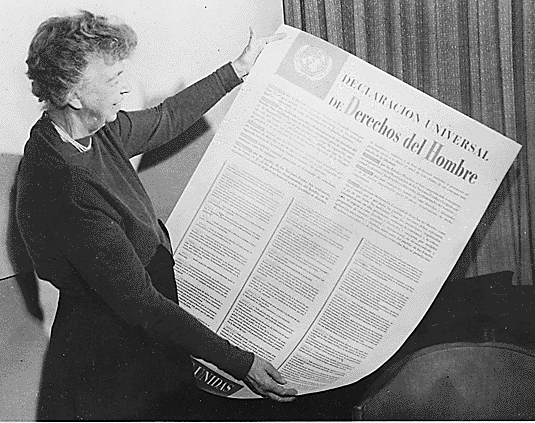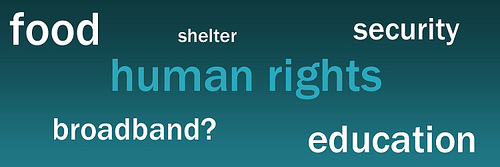A post-rights era?
Blog: Tom Graves / Tetradian
Do we now live in a post-rights era?
Rights so much seem part of the social fabric now – along with endless arguments about who should and shouldn’t have them, and why. But if there’s talk about ‘post-rights’, what’s really happening? And what, if anything, is wrong with rights?
To me, the short-answer to “Do we now live in a post-rights era?” is ‘Not yet – but we need to be‘.
More to the point, though, we should never have been in a ‘rights-era’ in the first place. And yes, I’m adamant about that. Even the very concept of ‘rights’, and its social implications, was for the most part a fundamental mistake, right from the very beginning. That’s the bit that gets missed out in most of the conversations on ‘post-rights’ and the like…
Where this starts for me is an article on the BBC website, ‘Are we heading towards a ‘post human rights world’?‘ (may be UK-only), back at the end of December.
The article begins with the question:
With an increasing number of states seemingly reluctant to honour human rights treaties, is there a future for this type of international agreement?
It focusses particularly on the United Nations’ ‘Universal Declaration of Human Rights‘:
The universal declaration promised (among other things) the right to life, the right not to be tortured, and the right to seek asylum from persecution.
The Declaration was promoted by and then presented to the fledgling United Nations by the former US First Lady (spouse of US President), Eleanor Roosevelt:
The catch is that the whole thing was and is very much an American project, built very much around the then-extant worldview of the only real ‘victors’ of the Second World War. And in part that does explain some of the resistance to the Universal Declaration, because many of the implicit assumptions beneath its surface values are not ‘universal’ at all. For example, US culture has long been acknowledged as hyper-focussed on the individual, an extreme outlier [PDF] even amongst the ‘WEIRD’ group of societies (‘Western, Educated, Industrialized, Rich, Democratic’); but for many other cultures, particularly in the so-called East, the collective and/or the family will take precedence over the individual. If we are to link all humans together, then somehow, somewhere we need to find something that genuinely is ‘universal’ amongst humans: and individual-oriented ‘rights’ just is not it…
The BBC article ends with this:
Peggy Hicks warns against hasty criticism of current human rights law, in the absence of any genuine alternatives.
“When we look at the alternatives there really aren’t any,” she said.
“Whatever flaws there may be in our current framework, if you don’t have something to replace it with, you better be awfully careful about trying to tear it down.”
But there is something to replace it with. Or rather, not replace as such, because it’s always been there, right from the very beginning, despite being masked by those ever-more-shrill claims about ‘rights’. It’s the one word that ‘rights’ often most seeks to avoid: responsibilities.
Or, specifically, the interlocking of mutual responsibilities, upon which every social interaction ultimately depends.
Take a long, careful look at so-called ‘rights’. In every case, the purported right starts out as a defence against some else’s avoidance of responsibility. Magna Carta: the barons’ ‘rights’ against the wilful self-centredness of a monarch. (Comparison with some aspects of present-day politics is, uh interesting…) The UK Bill of Rights: protections for the landowner/merchant-class against potential irresponsibility by the monarch. The US Bill of Rights: protections for the landowner/merchant class against irresponsibility by an unspecified someone-else. Women’s rights: protections for women against purported irresponsibilities by men.
‘Rights’ purport to be protections against paediarchy: ‘rule by, for and on behalf of the childish’. Every form of structural dysfunction in a society – be it plutocracy, kleptocracy, kakistocracy, or the neo-feudal hierarchies that predominate in most large organisations of today – every one of them is some other variant of paediarchy. And childishness – the driver behind paediarchy – is best summarised as a careless or wilful avoidance or rejection of self-responsibility, or mutual responsibilities to, for or about the Other. (Whatever that ‘Other’ may be – other humans, animals, machines, the world in general, whatever.)
Yet watch what happens after that first assertion of ‘rights’. In every case, the supposed good-intentions (if any) behind the ‘rights’ soon morphs into an assertion that the existence of said personal ‘rights’ implies an absence of responsibilities to or about others. Very quickly, it sinks into self-centrism: “I have rights, you have responsibilities”. Magna Carta was as much about defending the barons’ ‘rights’ to maintain their irresponsibilities to others as it was to protect themselves against the irresponsibilities of the monarch. Ditto the UK Bill of Rights: preserving the asymmetric ‘rights’ of the landowner/merchant class to be irresponsible towards all others. Ditto the US Bill of Rights; ditto, bluntly, most so-called ‘women’s rights’; ditto virtually every purported ‘right’ that exists.
In short, every ‘right’ enshrines evasion of mutual-responsibilities by those who purport to possess said ‘rights’.
Or, to put it another way, ‘rights’ purport to reduce structural abuses, but end up imposing new ones instead.
And whenever ‘rights’ are deemed to ‘absolute and inalienable’, the inevitable end-result is a dysfunctional mess. If traffic-law is built around ‘right of way’, and everyone has the same absolute ‘right’, then the only solution to a symmetric rights-clash is ‘might is right’. (Not A Good Idea…)
If so-called ‘Right To Life’ and so-called ‘Right To Choose’ are both absolute, both mother and child inevitably end up being mauled by an irredeemable mess of other people’s opinions. (Also Not A Good Idea…)
And every ‘right’ leads to messes like that: ‘legal right to high-speed broadband’, anyone?
The only way out of the ‘rights’-mess is to drop it completely, and start again from the actual thing that makes anything possible, which is the interlocking of personal and mutual responsibilities in a social context.
We need to stop pretending that we can resolve complex messes with simplistic absolutes such as ‘rights’.
The blunt fact is that ‘rights’ are a delusion; interlocking mutual responsibilities are the only things that make anything real. And the extent to which ‘rights’ enshrine evasions of mutuality or interlocking of responsibilities – as probably all so-called ‘rights’ now do – is the extent to which a society is crippled by its own purported ‘rights’.
The only thing that ‘rights’ are useful for is as a declaration of a desired outcome. That’s it: nothing else. From then, everything else needs to be about the responsibilities – literally, ‘response-abilities’, the ability to choose and enact appropriate responses in and to the context – and the mutualities and interlocks between those responsibilities.
For example, take that bleak clash between ‘Right To Choose’ and ‘Right To Life’. Both are socially-desirable outcomes: no question about that. In many cases – in most, we would hope – there is no clash between them. For example, it’s what leads to the need for safe obstetrics, safe childbirth, solid support for parenting, and more. But when those desirable-outcomes clash, the ultimate responsibilities must reside with the mother – the one with the literal ‘response-ability’ to bear the child. And that wherever those choices are hard (as they so often are…), the woman will need support in resolving and enacting the complexities of those responsibilities – not shrill assertions by others of often-irrelevant and usually-unhelpful ‘absolutes’.
(Even to that nominal rule that ‘the ultimate responsibility resides with the mother’, there will always be rare, sad exceptions – such as a brain-dead woman on life-support with a still-viable late-pregnancy. In short, almost nothing in a human context can be considered absolute…)
If the outcomes are skewed, or the ‘rights’ lead to socially-problematic outcomes, then we almost certainly need to shift the emphasis from ‘rights’ to the underlying responsibilities, and the mutuality and interlocks between them.
For example, take a core ‘right’ in the US Bill of Rights, the personal right to property. Some of the outcomes at present are, let’s say, somewhat problematic? We have a situation right now where just eight people claim to have the exclusive, absolute, inalienable ‘right’ to as many resources as are currently allowed to the poorer half of the global population – more than three billion people. There is, shall we say, a certain asymmetry there? What are the outcomes of that asymmetry? In a global sense, are those outcomes desirable or wise, and to or for whom? (Who gets to choose what is or is not desirable or wise? – and why them and not others?) What are the (lack of) mutualities and (lack of) interlocks from which such asymmetry might arise? If the current outcomes and undesirable and/or unwise, what amendments to responsibilities, mutualities and interlocks might be needed to move more towards more successful outcomes? Shift the emphasis from ‘rights’, to the overall desired-outcomes, then the underlying responsibilities, and the mutuality and interlocks between them.
For example, take another commonly-asserted core ‘right’ for individuals and corporations, the ‘right’ to use all legally-available means to avoid paying taxes. Many individuals become and remain rich that way; many corporations are only ‘profitable’ that way. It’s legal: that’s the whole point. But overall does it lead to social-outcomes that are socially-desirable or socially-wise? To quote a certain US politician, is it ‘smart’ to avoid paying what would otherwise seem to be a socially-fair proportion of tax? For the individual, perhaps ‘Yes’; but to judge by its social-outcomes – such the current state of much tax-funded infrastructure in the US – the societal answer would probably appear to be ‘No’. There’s no way to resolve that clash by an appeal to ‘rights’: everyone involved has ‘rights’ that purport to be absolute, and hence no negotiation possible, or even allowed. Which means the only available ‘answer’ is ‘might is right’ – which in the longer-term is most definitely Not A Good Idea… The only way out of the mess? Shift the emphasis from ‘rights’, to the overall desired-outcomes, then the underlying responsibilities, and the mutuality and interlocks between them.
The concept of ‘rights’ was a useful defence when the paediarchies were explicit and identifiable, and the deeper concepts of personal-responsibility and social-mutuality were more deeply ingrained in the respective culture. But the catch with the self-centrism of ‘rights’ is that it is itself a driver away from mutualities and interlocks; a driver towards rampant paediarchy across every aspect of a society. When the drive towards towards paediarchy – “I have rights, you have responsibilities” – becomes the dominant theme of a society, then ‘rights’ themselves become the real problem, rather than its real solution. That’s essentially the situation we’ve now reached, in virtually every aspect of every dominant culture in this world.
Viable households don’t run on ‘rights’ – they run on self-responsibilities and interlocking, mutual responsibilities.
Viable societies don’t run on ‘rights’ – they run on self-responsibilities and interlocking, mutual responsibilities.
Many ‘traditional’ societies have run for millennia – tens of millennia, in some cases – on self-responsibilities and interlocking, mutual responsibilities.
By contrast, present day ‘rights’-based societies run on self-centredness and systematic evasion of responsibilities, interlocks or mutualities. And at present, we’re fast approaching the end-game of that ‘rights’-based model, with virtually all indicators – all the way out to global scale – showing that, the way we’re going right now, we’ll be lucky to survive even for the next few decades, let alone anything much beyond that. That’s what happens when we over-focus on ‘rights’ rather than self-responsibilities and interlocking, mutual responsibilities.
The only way out of our current path towards collective suicide on a global scale is to drop the whole concept of ‘rights’. Drop it. Scrap it. Completely. Totally. Everywhere. No exceptions.
That is literally the only chance we have right now.
In place of self-centric ‘rights’, reframe everything in terms of ‘response-abilities’, the mutualities and interlocks of those responsibilities, to and about others, and to and about self. No exceptions, anywhere.
Take that beloved United Nations ‘Universal Declaration of Human Rights’. Recognise that, beloved though it has been, its ‘rights’-based model now makes it no longer a ‘solution’ to the global problems we face, but a core source of those self-same problems.
The only thing that those ‘declarations of rights’ provide is some suggestions towards socially-desirable outcomes. That’s it: nothing else at all.
So for every ‘right’ in that so-called ‘Universal Declaration’, take it as a suggestion towards some socially-desirable outcome. That’s it: nothing else at all.
And then apply the critical-thinking that we need, the social-explorations that we need, the deep-questioning of deep-myths that we need. If we says it’s a ‘universal’ desired-outcome, is it actually universal? If not, what would be ‘universal’, and what would need to be context-specific, or culture-specific? Why? Who says it’s a desirable outcome? Or wise? In what sense? And who gets to choose? Who doesn’t get to choose? On and on: none of these are simple questions, probably none are as ‘universal’ as claimed, and almost certainly none could be considered ‘absolute’ at all.
From there, once we have some sense of what is desirable and wise, then explore in similar depth, the response-abilities, and interlocks that would be needed to make all of that work, at a fully global scale, and sustainable onward into the indefinite future – with timescales measured in millennia at least. If we can’t identify all of those, we won’t be able to make it work; and if we can’t make it work, globally, sustainably, then we’re dead. All of us. It really is as stark as that.
Once we’ve done all of that to the so-called ‘Universal Declaration of Human Rights’, we can perhaps start to do the same with every other so-called ‘right’. Because if we don’t do that, we’re dead. All of us. It really is as stark as that.
And we don’t have much time to do this. The time to get moving on this is now.
Hence, to that question, “Do we now live in a post-rights era?” the only sane answer is ‘Not yet – but urgently we need to be‘.
So over to you: your choice. What are you doing – and doing now – to help make that happen? Because if you don’t – not just everyone else, but you as well – then we’re as good as dead. All of us – including you. It really is as stark a choice as that.
Leave a Comment
You must be logged in to post a comment.









